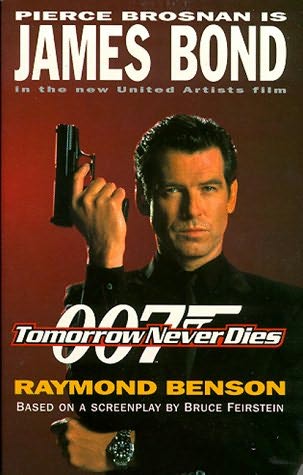 The Tomorrow Never Dies novel by Raymond Benson follows the plot lines closely of the final film. Author Benson wrote his book from an early script provided to him by EON. For purposes of rushing the book to coincide with the film’s release, (publishers need the books completed months ahead) authors typically write from first script drafts—even if the film hasn’t wrapped shooting and changes the final result!
The Tomorrow Never Dies novel by Raymond Benson follows the plot lines closely of the final film. Author Benson wrote his book from an early script provided to him by EON. For purposes of rushing the book to coincide with the film’s release, (publishers need the books completed months ahead) authors typically write from first script drafts—even if the film hasn’t wrapped shooting and changes the final result!
Mr. Benson has himself stated that Tomorrow Never Dies and his forthcoming The World Is Not Enough are not among his favorite efforts because they were done at speed to satisfy the fans. First printings of the British hardback of TND, however, are fetching nearly $200 US, due to their selling out from bookstores in a matter of days after its release.
Which juicy tidbits make it to the book that are not on celluloid? Intriguing lines of Bruce Feirstein’s scripted dialogue and character backgrounds, mostly.
Villains:
Intriguingly, Raymond Benson’s Stamper was genetically engineered to be without nerve endings! In effect, he can “feel no pain,” a skill numerous moviegoers might envy. In the film Stamper’s invulnerability is nearly unexplored—watch when he smiles as Bond’s knife finds a target in his leg. Stamper apparently enjoys snuff video, and possibly pornography also, for his lighter TV watching. In the final film, his crew on Carver’s “Stealth Ship” videotapes the gunning down of Devonshire survivors. This plot element is not played to any effect greater than a quick, greedy glance between Carver and Stamper, who share a taste for sensational video in the novel.
Allies:
In the novel, MI6 Chief of Staff, Bill Tanner, appears from the beginning, but in the film this longtime ally has been replaced by “Get out of it, James!” Robinson.
After escaping from the Khyber Pass alive, Bond (White Knight) sends a message to the haughty Admiral Roebuck, code named Black King: “…you can tell the Black King that the White Knight would like to shove the whole chessboard right up his bishop!” In the final film, this provocative line has been replaced with the terse: “Ask the Admiral where he’d like these (bombs) delivered.”
The exotic Wai Lin has a background mission that hastens her visit to Elliot Carver’s Hamburg headquarters. She receives orders from a “General Koh” to investigate “General Chang.” The film has pitched Wai Lin’s assignment from her superiors, and a silent General Chang is glimpsed once by Wai Lin and Bond.
Wai Lin and 007 make hanky-panky before boarding the Stealth Ship and again after its destruction. In the film, we are teased with an embrace as the final credits roll.
Both 007 and Wai Lin pose as bankers, while in the film Wai Lin’s television reporter cover earns a few risqué laughs from Carver when he threatens to “get Miss Lin behind a news desk.”
In the book, Paris is “introduced” to James Bond by her hubby, Elliot Carver. She promptly slaps Bond silly and rushes Wai Lin into a powder room to gossip about him! In the film, of course, Bond stalks up behind Paris, alone, and quips “I’ve always wondered how I’d feel if I ever saw you again.” This line comes from their hotel room scene in the novel.
